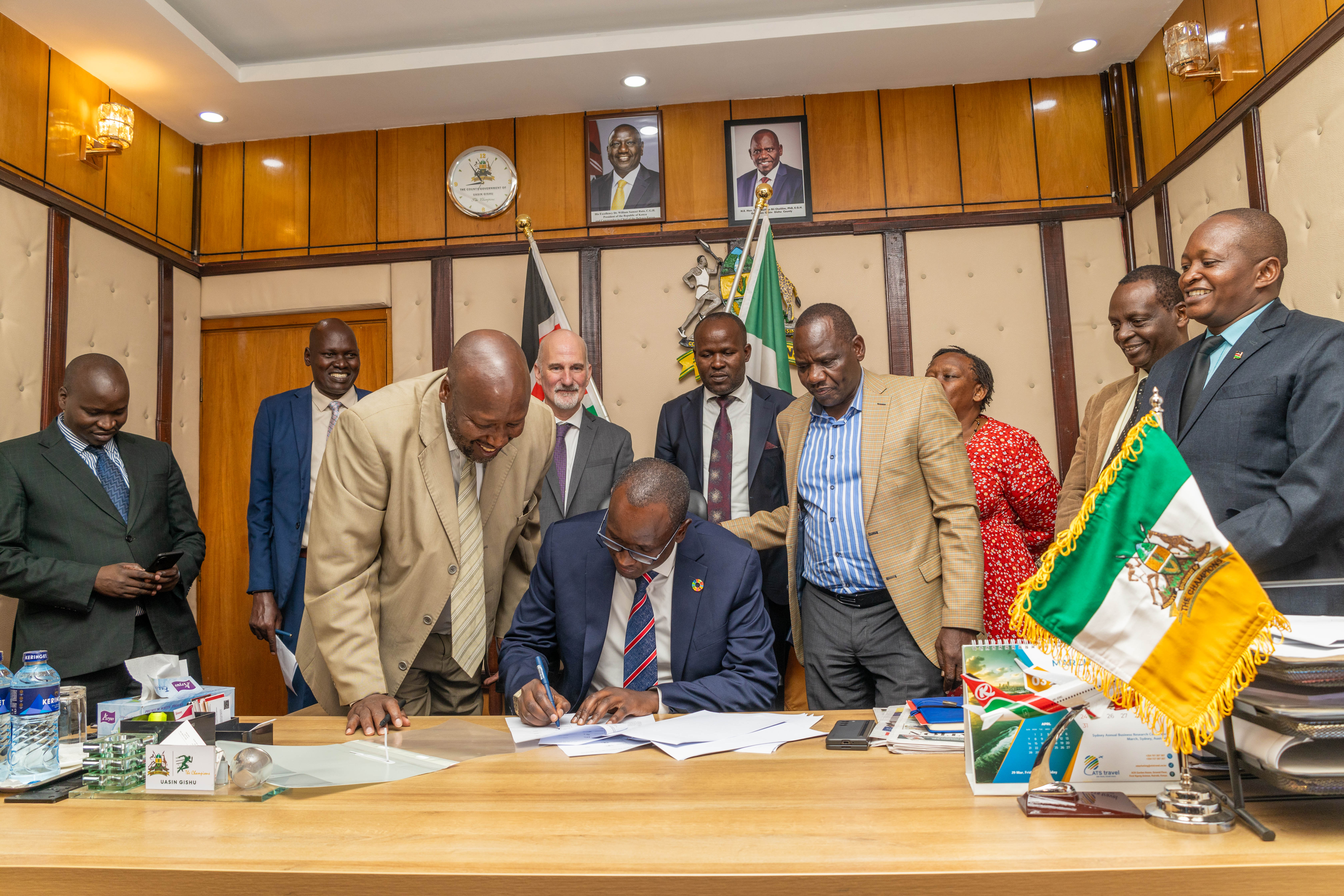
The University of Liverpool has signed a Memorandum of Understanding (MoU) with government stakeholders in Kenya to coincide with the launch of a new initiative to address the burden of disease from household air pollution (HAP). This will provide more than 16,000 community groups direct access to life saving information about preventing exposure to HAP.
This formalised agreement will see 40,000 community members in Uasin Gishu County (one of Kenya’s 47 counties) receive education by trained Kenyan Community Health Workers to provide latest advice on the health impacts of HAP and prevention through clean household energy. This will be achieved through empowering table-banking groups across Uasin Gishu with knowledge on health and prevention through clean energy solutions.
The MoU outlines the Table Banking Led Education for Prevention of Household Air Pollution (TABLE- HAP), developed and funded by the University. Through TABLE-HAP, table-banking groups – a group-based funding system where members meet weekly and make weekly savings to form a kitty from which members can borrow – will be given knowledge to empower them as change makers for their wider communities. The table banks provide a facility to purchase clean cooking, heating and lighting equipment and the Kenyan Ministry of Energy is screening commercial companies across Kenya to be connected to the initiative to help provide clean energy solutions to communities.

In Uasin Gishu, like most of Kenya, more than 60% of people rely on traditional biomass fuels like wood, and charcoal, for cooking. HAP from burning these fuels causes respiratory illnesses, heart disease, eye cataracts, and low birth weight and leads to climate change, and environmental degradation. Increasing awareness on these health impacts is seen as a major driver to behaviour change in the country and TABLE-HAP will be incorporated into Kenya’s strategy to reach Universal Access to Clean Modern Energy (Sustainable Development Goal 7) by 2028.
Professor Dan Pope, co- Director of NIHR CLEAN-Air(Africa) Global Health Research Unit signed the MoU alongside representatives from Uasin Gishu County Government, and MaMa Doing Good Foundation, an NGO formed by the First Lady of the Republic of Kenya (HE Rachel Ruto).
Hon. Jonathan Bii, Governor of Uasin Gishu County said: “This collaboration is a crucial step towards creating a healthy community; where the old enjoy quality life and the women and children live in dignity. By equipping table banking groups with the knowledge and resources to promote clean energy solutions, we can empower communities to improve their health, protect the environment, and contribute to climate action.”
Professor Pope, representing the University of Liverpool and Director of CLEAN-Air(Africa), echoed the Governor’s sentiment and continued: “We are delighted to partner with Kenya Medical Research Institute, MaMa Doing Good and the County Government of Uasin Gishu to launch this important health promotion campaign, the first of its kind directly linked to community health structures. Empowering communities with the right evidence for preventing HAP related disease from household solid fuels will help create demand in Kenya’s push for universal access to clean modern energy by 2028.”
The TABLE-HAP initiative has been built on the Community Household Air Pollution Prevention Programme (CHAP-PP) that was developed by the University to train all 130,000 Community Health Workers (CHWs) in Kenya on how to address HAP through the community health system. Working with the Ministry of Health, CHAP-PP has now been delivered to 2500 Public Health Officers across Kenya who have become the ‘trainers’ for the CHWs across the 47 counties.
MaMa Doing Good, led by First Lady H. E Rachel Ruto, will leverage its existing community networks of 16,000+ table-banking groups across the country to facilitate a national rollout. Ms. Kosgei, CEO MaMa Doing Good, emphasized the importance of community engagement: “MaMa Doing Good is committed to empowering women and communities at the grassroots level. This sensitization program aligns perfectly with our mission, and we are confident that table banking groups offers an excellent opportunity to engage with communities as effective advocates for clean energy within their communities.”
TABLE-HAP is endorsed by the Ministry of Health for implementation alongside the official training of CHWs with CHAP-PP. The University of Liverpool, Kenya Medical Research Institute (KEMRI), and Moi University as investigator leads for CLEAN-Air(Africa), will monitor and evaluate implementation of both programs in Kenya. Similar training is ongoing in CLEAN-Air(Africa) focus countries including Uganda, Rwanda and Cameroon.
More about NIHR CLEAN-Air(Africa) Global Health Research Unit
CLEAN-Air(Africa) is a collaboration funded by the UK government to address the major global health challenge from household air pollution. It is a partnership of public health experts from academic, research, and clinical institutions from the UK, Cameroon, Kenya, Tanzania, Rwanda, and Uganda. Working with governments from each country, the collaboration provides evidence to help inform policies to scale clean cooking for households and schools to address disease burden from air pollution associated with reliance on wood and other polluting fuels. A key component to this is raising population awareness of the issue through health systems strengthening.